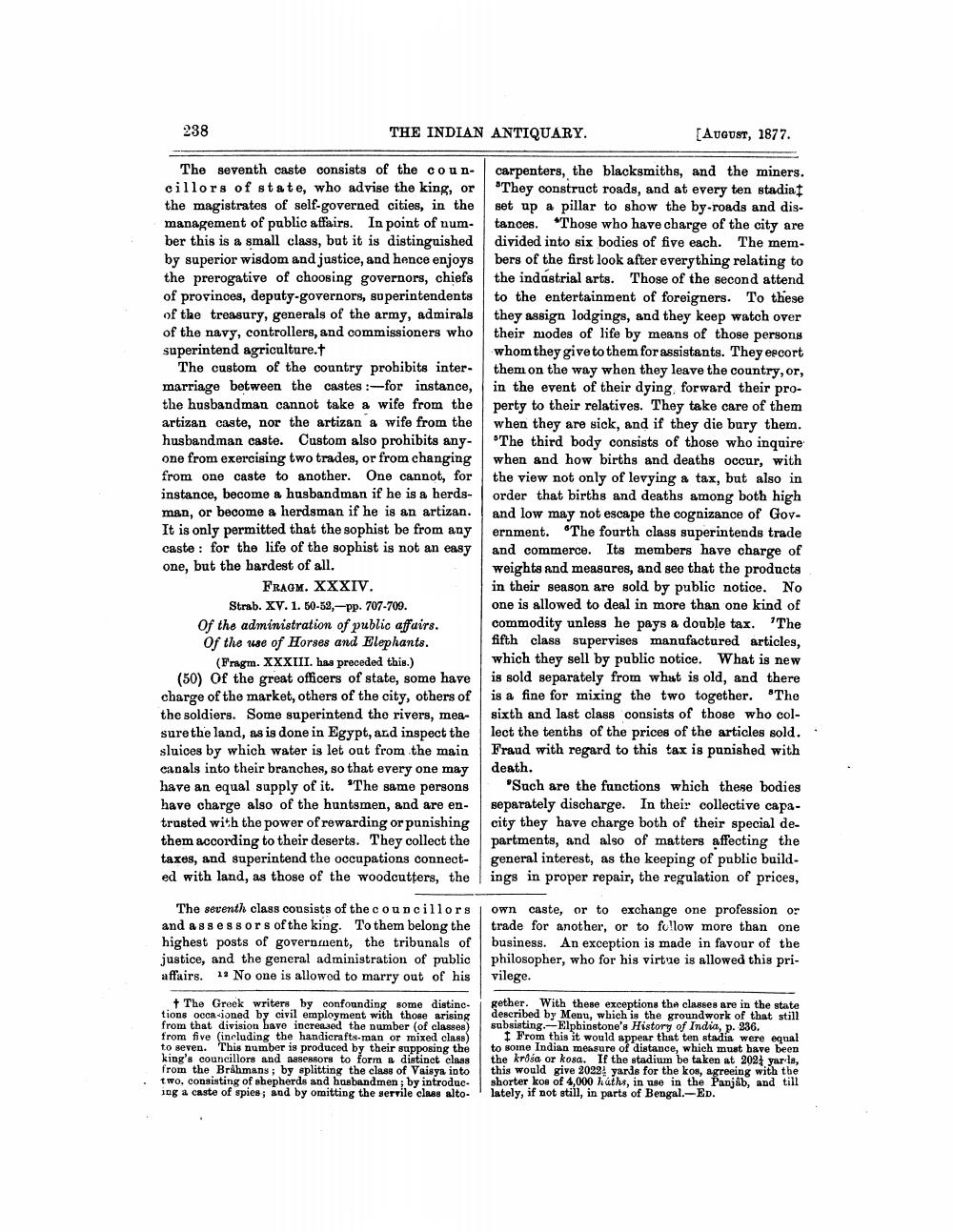________________
238
THE INDIAN ANTIQUARY.
[AUGUST, 1877.
The seventh caste consists of the coun- carpenters, the blacksmiths, and the miners. cillors of state, who advise the king, or *They construct roads, and at every ten stadia the magistrates of self-governed cities, in the set up a pillar to show the by-roads and dismanagement of public affairs. In point of num. tances. Those who have charge of the city are ber this is a small class, but it is distinguished divided into six bodies of five each. The memby superior wisdom and justice, and hence enjoys bers of the first look after everything relating to the prerogative of choosing governors, chiefs the industrial arts. Those of the second attend of provinces, deputy-governors, superintendents to the entertainment of foreigners. To these of the treasury, generals of the army, admirals they assign lodgings, and they keep watch over of the navy, controllers, and commissioners who their modes of life by means of those persons superintend agriculture.t
whom they give to them for assistants. They eecort The custom of the country prohibits inter
them on the way when they leave the country, or, marriage between the castes :--for instance, in the event of their dying forward their prothe husbandman cannot take a wife from the perty to their relatives. They take care of them artizan caste, nor the artizan a wife from the when they are sick, and if they die bury them. husbandman caste. Custom also prohibits any- "The third body consists of those who inquire one from exercising two trades, or from changing when and how births and deaths occur, with from one caste to another. One cannot, for the view not only of levying a tax, but also in instance, become a husbandman if he is a herds- order that births and deaths among both high man, or become a herdsman if he is an artizan. and low may not escape the cognizance of Gov. It is only permitted that the sophist be from any ernment. The fourth class superintends trade caste: for the life of the sophist is not an easy and commerce. Its members have charge of one, but the hardest of all.
weights and measures, and see that the products FRAGM. XXXIV.
in their season are sold by public notice. No Strab. XV. 1. 50-52,- pp. 707-709.
one is allowed to deal in more than one kind of Of the administration of public affuirs. commodity unless he pays a double tax. 'The Of the use of Horses and Elephants. fifth class supervises manufactured articles, (Fragm. XXXIII. has preceded this.)
which they sell by public notice. What is new (50) Of the great officers of state, some have is sold separately from what is old, and there charge of the market, others of the city, others of is a fine for mixing the two together. The the soldiers. Some superintend the rivers, mea- sixth and last class consists of those who colsure the land, as is done in Egypt, and inspect the lect the tenths of the prices of the articles sold. sluices by which water is let out from the main Fraud with regard to this tax is punished with canals into their branches, so that every one may death. have an equal supply of it. The same persons "Such are the functions which these bodies have charge also of the huntsmen, and are en- separately discharge. In their collective capatrusted with the power of rewarding or punishing city they have charge both of their special dethem according to their deserts. They collect the partments, and also of matters affecting the taxes, and superintend the occupations connect- general interest, as the keeping of public builded with land, as those of the woodcutters, the lings in proper repair, the regulation of prices,
The seventh class consists of the councillors and a ssessors of the king. To them belong the highest posts of government, the tribunals of justice, and the general administration of public affairs. 12 No one is allowed to marry out of his
own caste, or to exchange one profession or trade for another, or to follow more than one business. An exception is made in favour of the philosopher, who for his virtue is allowed this privilege.
+ The Greek writers by confounding some distinctions occasioned by civil employment with those arising from that division have increased the number of classes) from five (including the handicraftsman or mixed class) to seven. This number is produced by their supposing the king's councillors and assessors to form a distinct class from the Bråhmans; by splitting the class of Vaisya into two, consisting of ahepherds and husbandmen; by introduc. ing a caste of spies; and by omitting the servile class alto
gether. With these exceptions the classes are in the state described by Menu, which is the groundwork of that still subsisting.-Elphinstone's History of India, p. 236.
From this it would appear that ten stadia were equal to some Indian measure of distance, which must bave been the krosa or kosa. If the stadium be taken at 2024 yar is, this would give 2022! yards for the kos, agreeing with the shorter kos of 4,000 háths, in use in the Panjab, and till lately, if not still, in parts of Bengal.-Ed.




